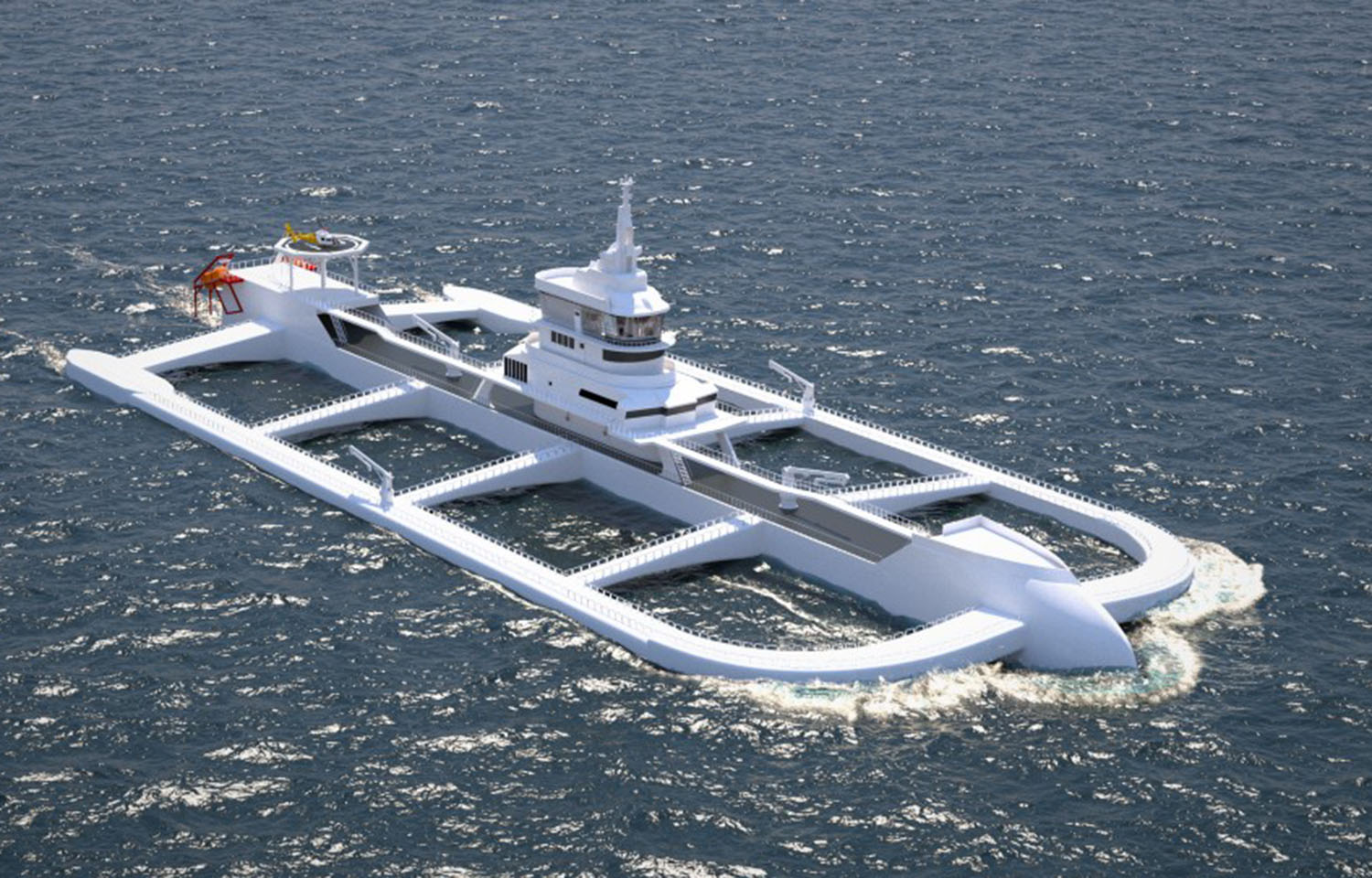DNV and Ocean Sovereign are advancing plans to launch the Ocean Ark, a vessel equipped with offshore aquaculture capabilities.
The Ocean Ark is able to travel up to 4 knots on its own and is also able to be towed by a tugboat. It is capable of farming up to 3,900 metric tons of salmon, trout, cobia, tuna, or seriola per cycle, according to a promotional video.
Oslo, Norway-based DNV is an independent assurance and risk management provider with operations in more than 100 countries.
London, U.K.-headquartered Ocean Sovereign is a developer of agri-food solutions focused on offshore fish farming and fruit, berry, and vegetable production. It is led by managing director Zeyd Fassi Fehri, the former director of the trading room for Safa Bourse Morocco CDG Group; Cristino Stange, who developed Nichiro’s coho salmon-farming operations in Chile in the 1970s and '80s; Héctor Ruiz, a retired captain in the Chilean Navy; and Rodrigo Sanchez, the former marketing and development manager for Salmones AquaChile and former CEO of EcoSea Farming.
Ocean Sovereign has developed the Ocean Ark concept in adherence with Marpol, Solas, and IMO regulations, it said. The vessel – measuring 550 feet (170 meters) by 197 feet (60 meters) – is specifically designed to operate offshore in waves up to seven meters in height, allowing for repositioning to optimize farming conditions. It can be operated fully autonomously for 20 to 25 days, with harvesting completed by wellboat or via docking near onshore processing facilities. It is capable of being equipped with eight cages of 115-foot width or four cages of 210-foot width, with each cage 115 feet long and 66 feet deep. Its anti-fouling copper-zinc alloy mesh cages allow for better structural resistance and predator protection, according to Ocean Sovereign.
DNV said it is supporting Ocean Sovereign with “business-critical challenges and innovations, designed to prevent fish escape and reduce risk of technical failure in operation by delivering classification of the floating structure/vessel and marine systems; certification of mooring/dynamic positioning system; certification of aquaculture nets and systems; and assessing operation and integrity controls during the design's lifetime.”
“To achieve this, DNV will work with Ocean Sovereign by setting up a regulatory framework to fulfill local requirements in alignment with rules and standards of the French authorities,” it said.
“DNV is proud to safeguard innovative technology to deliver sustainable seafood products to consumers,” DNV Global Aquaculture, Supply Chain, and Product Assurance Director Thomas Vogth-Eriksen said. “As a global leader in advancing the safety, efficiency, and sustainability of a range of ocean-based industries, we are particularly pleased to support knowledge-driven solutions that contribute to the sustainable growth of the aquaculture sector.”
France was chosen for Ocean Ark’s marine registration because of its large maritime exclusive economic zone, allowing for wide deployment, as well as its status as Europe’s largest market for salmon, according to Fassi Fehri.
Fassi Fehri said his firm has signed additional partnerships with French aquaculture and fishing stakeholders, with details coming soon.
“As well as sustainability and fish welfare, the inclusion of local communities is embedded into every Ocean Sovereign project. The deployment of the Ocean Ark offers many synergies and growth opportunities for the existing local aquaculture and fishing sector,” Fassi Fehri said.
Fassi Fehri said the primary advantage of the Ocean Ark concept is to enable the avoidance of marine heatwaves, algal blooms, and storms – what he called “aquaculture’s three Achilles’ heels.” This will enable improved fish welfare, the production of high-quality protein, and increased global fish production, without increasing pressures on fish stocks and coastal habitats, he said.
“Offshore fish production is based on a combination of two well-known concepts – fish farming and offshore technology – and, therefore, a cross-industry approach and know-how is needed,” Fassi Fehri said in a press release. “At Ocean Sovereign, we are happy to join forces with DNV and benefit from their knowledge gained through decades of experience in these two fields that will allow us to safely deploy the vessels. We believe that DNV’s extensive experience in offshore and fish farming will help us to play a key role in the deployment of our vessels under French registration.”








